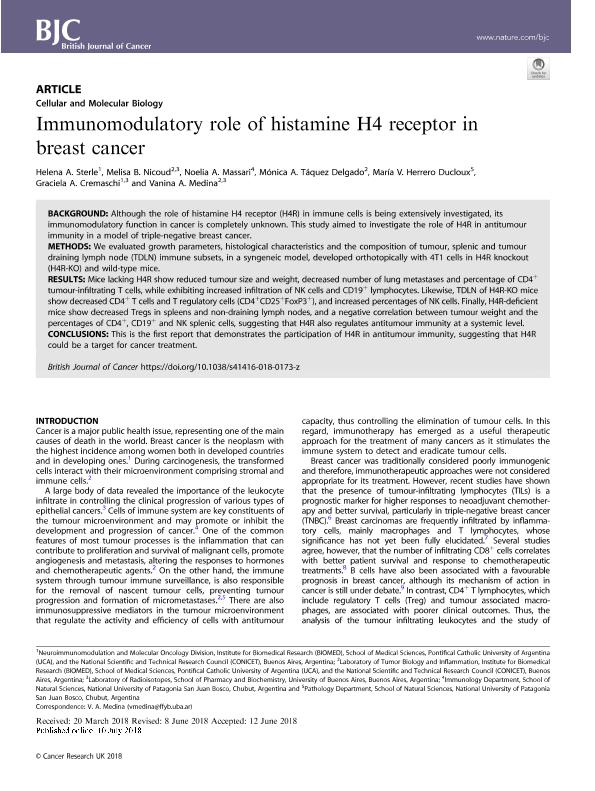Artículo
Immunomodulatory role of histamine H4 receptor in breast cancer
Sterle, Helena Andrea ; Nicoud, Melisa Beatriz
; Nicoud, Melisa Beatriz ; Massari, Noelia Andrea
; Massari, Noelia Andrea ; Táquez Delgado, Mónica Alejandra
; Táquez Delgado, Mónica Alejandra ; Herrero Ducloux, María Verónica; Cremaschi, Graciela Alicia
; Herrero Ducloux, María Verónica; Cremaschi, Graciela Alicia ; Medina, Vanina Araceli
; Medina, Vanina Araceli
 ; Nicoud, Melisa Beatriz
; Nicoud, Melisa Beatriz ; Massari, Noelia Andrea
; Massari, Noelia Andrea ; Táquez Delgado, Mónica Alejandra
; Táquez Delgado, Mónica Alejandra ; Herrero Ducloux, María Verónica; Cremaschi, Graciela Alicia
; Herrero Ducloux, María Verónica; Cremaschi, Graciela Alicia ; Medina, Vanina Araceli
; Medina, Vanina Araceli
Fecha de publicación:
01/2019
Editorial:
Nature Publishing Group
Revista:
British Journal Of Cancer
ISSN:
0007-0920
Idioma:
Inglés
Tipo de recurso:
Artículo publicado
Clasificación temática:
Resumen
Background: Although the role of histamine H4 receptor (H4R) in immune cells is being extensively investigated, its immunomodulatory function in cancer is completely unknown. This study aimed to investigate the role of H4R in antitumour immunity in a model of triple-negative breast cancer. Methods: We evaluated growth parameters, histological characteristics and the composition of tumour, splenic and tumour draining lymph node (TDLN) immune subsets, in a syngeneic model, developed orthotopically with 4T1 cells in H4R knockout (H4R-KO) and wild-type mice. Results: Mice lacking H4R show reduced tumour size and weight, decreased number of lung metastases and percentage of CD4 + tumour-infiltrating T cells, while exhibiting increased infiltration of NK cells and CD19 + lymphocytes. Likewise, TDLN of H4R-KO mice show decreased CD4 + T cells and T regulatory cells (CD4 + CD25 + FoxP3 + ), and increased percentages of NK cells. Finally, H4R-deficient mice show decreased Tregs in spleens and non-draining lymph nodes, and a negative correlation between tumour weight and the percentages of CD4 + , CD19 + and NK splenic cells, suggesting that H4R also regulates antitumour immunity at a systemic level. Conclusions: This is the first report that demonstrates the participation of H4R in antitumour immunity, suggesting that H4R could be a target for cancer treatment.
Palabras clave:
Histamine H4 receptor
,
Breast Cancer
,
antitumor immunity
Archivos asociados
Licencia
Identificadores
Colecciones
Articulos(BIOMED)
Articulos de INSTITUTO DE INVESTIGACIONES BIOMEDICAS
Articulos de INSTITUTO DE INVESTIGACIONES BIOMEDICAS
Citación
Sterle, Helena Andrea; Nicoud, Melisa Beatriz; Massari, Noelia Andrea; Táquez Delgado, Mónica Alejandra; Herrero Ducloux, María Verónica; et al.; Immunomodulatory role of histamine H4 receptor in breast cancer; Nature Publishing Group; British Journal Of Cancer; 120; 1; 1-2019; 128-138
Compartir
Altmétricas



